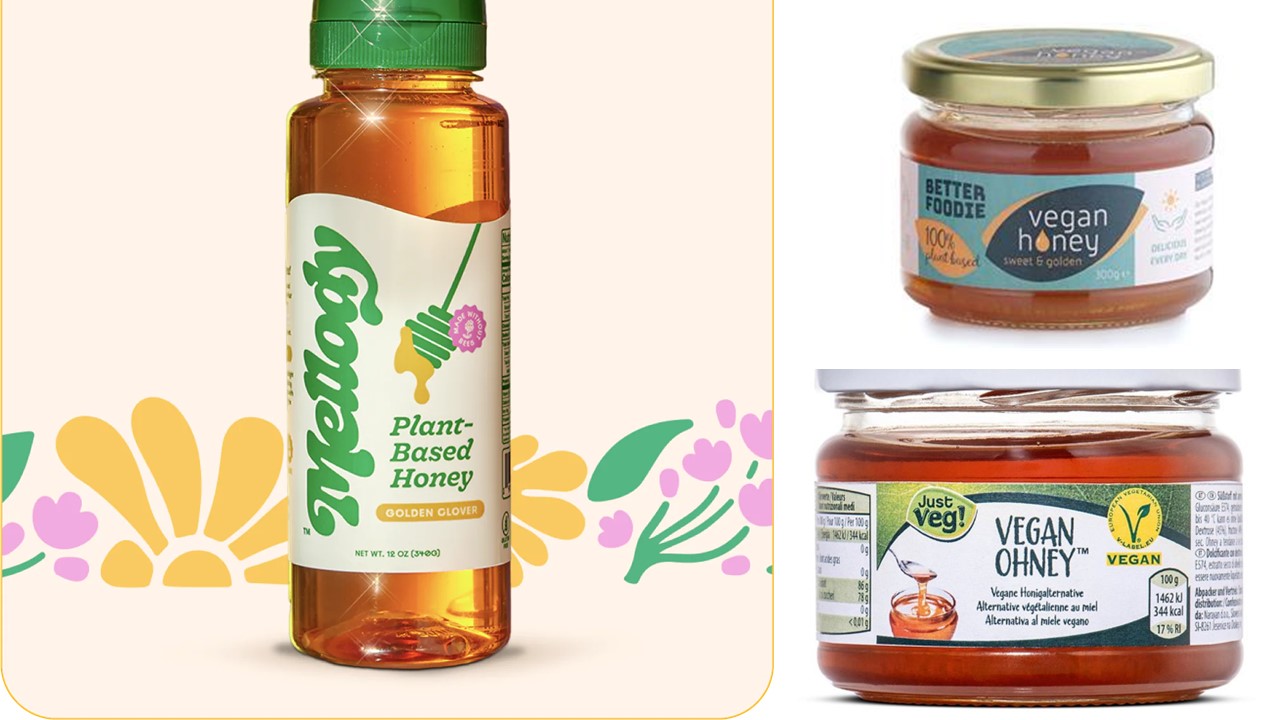MeliBio, a California-based startup developing honey without bees, is rolling out its first products in partnership with Slovenian food maker Narayan in the UK, Switzerland, and Austria in the first part of a $10m, four-year deal to reach 75,000 stores across Europe.
The plant-based ‘bee-free’ sweetener is sold under ALDI’s Just Veg! private label brand in Hofer stores in Austria and Switzerland, and under the Better Foodie brand in the UK, where it is rolling out to around 200 independent stores.
In the US, where MelBio has launched its own brand (‘Mellody’) for foodservice and direct to consumer channels, the product is described as ‘plant-based honey,’ and has a slightly different formulation, says cofounder and CEO Darko Mandich, a Serbian entrepreneur and honey-enthusiast who teamed up with molecular biologist Dr. Aaron Schaller to create MeliBio in 2020.
“The first versions of our product are 100% plant-based, inspired by light clover honey and acacia honey,” he tells AgFunderNews. “But we are also working on proprietary precision fermentation technology that more closely replicates the [multistep enzymatic] process that bees use to convert nectar into honey. A 100% plant-based approach doesn’t work for all types of honey and the plant-based product is not 100% identical [to honey produced by bees].”
The plant-based formulation, which contains 80% fructose and glucose and 18% water, gets its distinct flavor and properties from a blend of plant extracts comprising the remaining 2%. In the US it uses red clover, jasmine, passionflower, chamomile, and seaberry, coupled with gluconic acid and natural flavors, while in Europe, the plant extract blend is slightly different, says Mandich.
The product is variously marketed as vegan ‘hanny,’ ‘ohney’ and ‘h*ney’ in Europe, and ‘plant-based honey’ in the US, where there is no federal standard of identity for honey (although the FDA non-binding guidance issued in 2018 notes that reference materials define honey as ‘a thick, sweet, syrupy substance that bees make as food from the nectar of plants or secretions of living parts of plants’).

The case for bee-free honey
But why make honey without bees in the first place? Is this a solution looking for a problem?
The first argument for bee-free honey is about simple economics, according to MeliBio. Put simply, demand for honey is rising and honey bee populations are declining due to viruses, parasites, bacterial and fungal pathogens, and climate change, creating an opportunity for vegan alternatives.
“I remember back in 2012 when I worked at a honey company, we were paying beekeepers about [euro] 50 cents per kilogram of honey,” recalls Mandich. “Today in Europe, some of the beekeepers are paid 20x that. Essentially honey will become more and more premium and less accessible.
“There will always be demand for honey [made by bees] but I predict that 10 years from now, it will be an expensive artisanal gift only for special occasions that people might be paying $100 per jar for at the farmer’s market, while the majority of the market will be supplied by companies such as MeliBio.
“Beekeeping is also becoming more and more difficult. In countries such as Serbia, the average age of a beekeeper is 58 and new generations are not taking over.”
He added: “What’s also exciting is that we’ve already scaled to a level of a medium-sized honey company, where we make about 10,000 pounds or more per day of plant-based honey via co-packers.
“And we’ve got here on less than $10 million in seed funding,” notes Mandich, who is aiming to close a series A round in the first half of this year.
Biodiversity and sustainability
The second argument for bee-free honey spans ethics, biodiversity, and sustainability, says Mandich, who notes that while there are thousands of bee species that can pollinate different plants, there are only a handful of varieties of managed honeybees, which are bred for high productivity and only pollinate selected plants.
This has narrowed the gene pool and increased susceptibility to disease and large-scale die-offs, claims Mandich, who claims the presence of managed bees has a negative effect on native pollinators, by crowding them out and exposing them to disease.
Meanwhile, all bees are susceptible to climate change, habitat loss, and pesticide assault, he claims.
IP strategy, global ambitions
Asked about IP, he says: “We have a PCT patent application on plant-based honey composition in multiple regions in the world, plus trade secrets. On the precision fermentation side, we also have some patent applications pending along with trade secrets.”
Historically, he contends, vegan honey products were “created for vegans. We created MeliBio to become the most impactful, influential, and eventually the largest honey company in the world that just happens to make products that fit into a vegan diet.
“Because of that, our approach is really to get the product as close to the real thing as possible at an affordable price point. ALDI is a massive global corporate that’s very price sensitive, so by landing this deal we are confirming that MeliBio technology can play at that level of price sensitivity which ALDI requires.”





